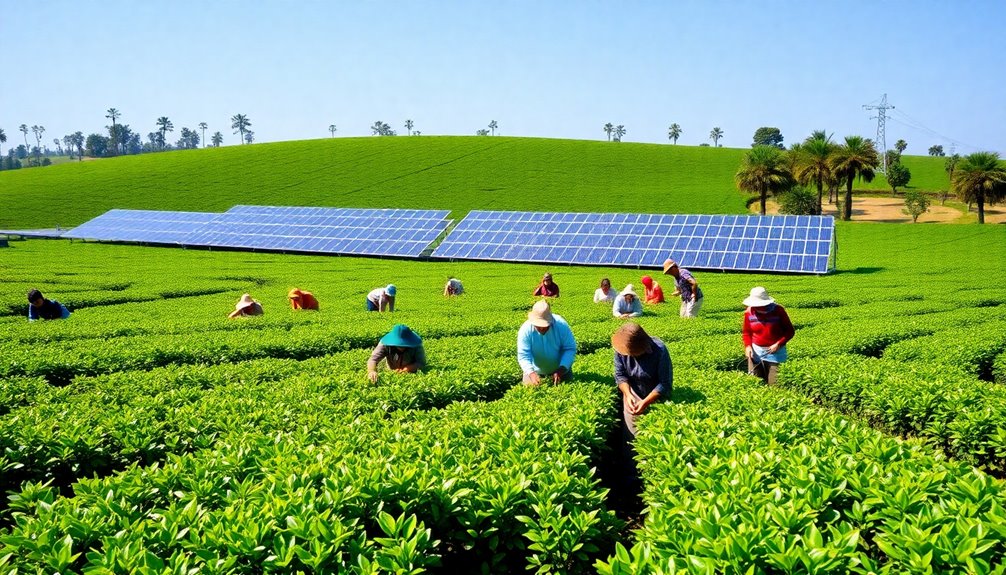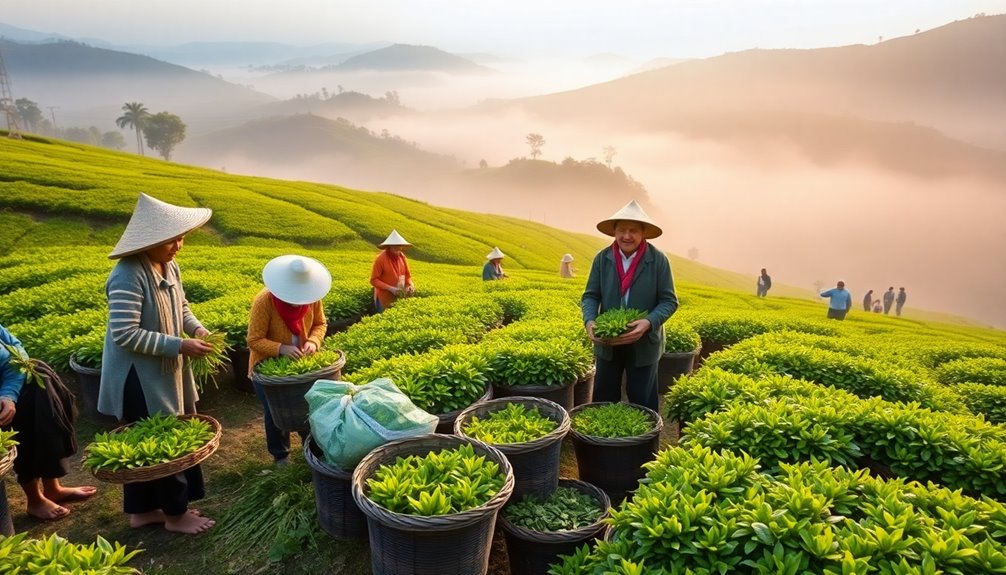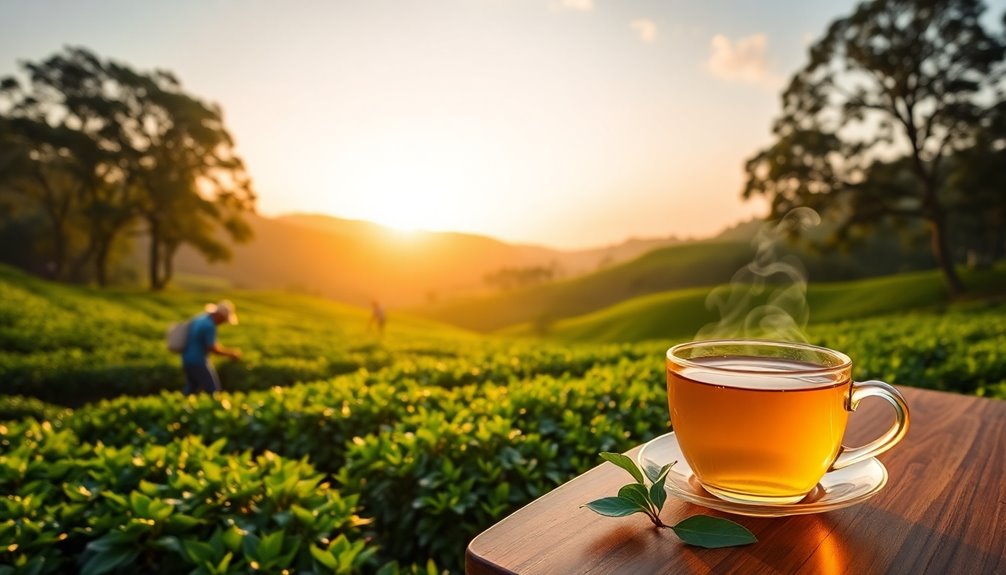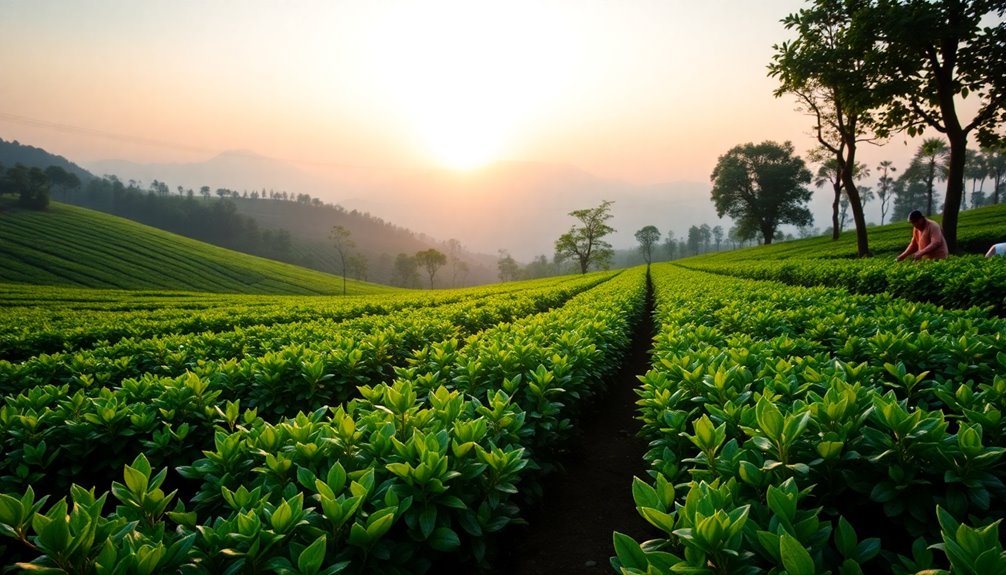Sustainable tea sourcing matters more than ever because it helps our planet, supports hard-working farmers, and gives you tasty, healthy tea options. When tea is sourced sustainably, it protects biodiversity and reduces pollution from harmful chemicals. Plus, it makes sure farmers get fair wages and work in safe conditions. More people are curious about where their tea comes from, and they want to make responsible choices. By choosing sustainable tea, you're joining a growing community that cares about the environment and cultural traditions. And there's so much more to discover about how your choices can make a difference!
Key Takeaways
- Sustainable tea sourcing mitigates environmental challenges, reducing pollution and promoting biodiversity essential for a healthier planet.
- The rise in consumer demand for ethically sourced products drives brands to adopt sustainable practices, enhancing market competitiveness.
- Transparency in tea sourcing is increasingly desired by consumers, fostering trust and loyalty towards brands committed to ethical practices.
- Ethical sourcing improves labor conditions for tea workers, combating exploitation and ensuring fair wages and safer working environments.
- Celebrating cultural heritage through sustainable tea sourcing enriches the consumer experience, connecting them to traditions and communities behind each cup.
Introduction
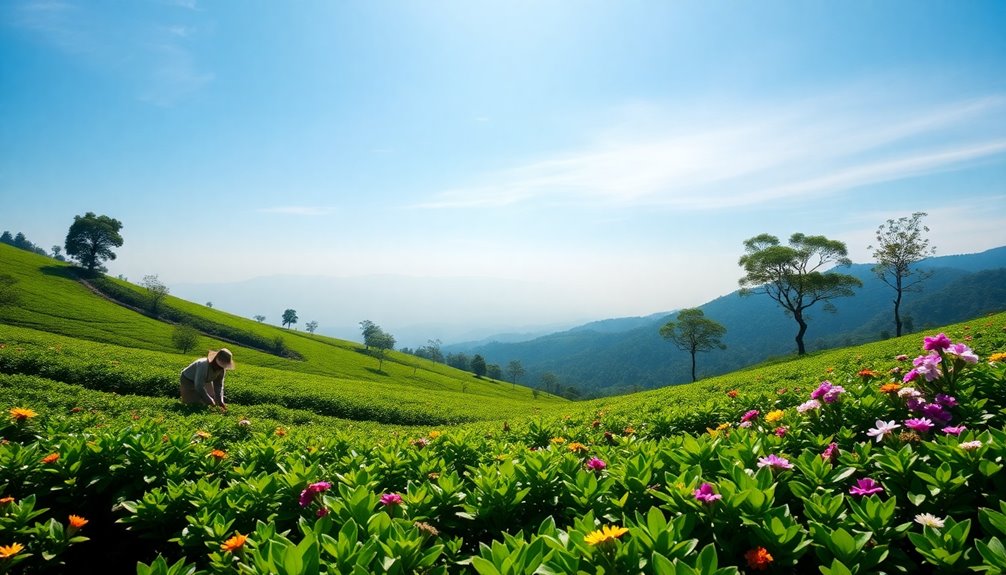
Sustainable tea sourcing is essential for addressing the environmental challenges posed by traditional tea production. When you think about tea farming, imagine lush green fields where plants thrive without harming the planet. Sadly, many tea farms have contributed to problems like biodiversity loss and pollution due to harmful pesticides.
But there's hope! By choosing sustainable practices, we can help protect our environment.
You might wonder, how does this relate to climate change? Well, sustainable tea farming promotes healthy soil and reduces resource depletion, making it easier for farmers to adapt to changing weather patterns.
Plus, ethical sourcing is becoming more important to consumers like you. Did you know that 71% of people want to know where their products come from? By supporting sustainable tea, you're helping ensure fair wages and better working conditions for farmers.
It's exciting to see a rise in eco-friendly teas that reflect our desire for transparency. When you sip a cup of sustainable tea, you're not just enjoying a delicious drink; you're also making a positive impact on the world.
Together, we can foster biodiversity and support a healthier planet through our choices!
Global Tea Demand Surge
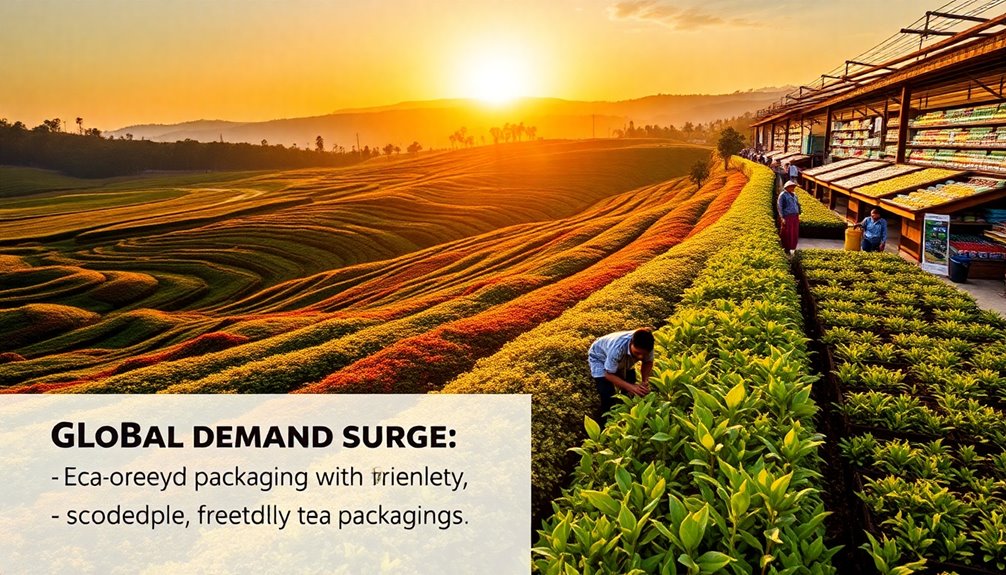
As tea continues to gain popularity around the globe, demand has surged to impressive levels. In the U.S. alone, people consumed over 3.8 billion gallons of tea in 2019! That's a lot of tea!
With more than 159 million daily tea drinkers, the tea industry is booming. Excitingly, there are over 2,500 varieties of tea to choose from, which keeps things fresh and interesting.
This growing love for tea also brings a wonderful opportunity for tea farmers. Many people now prefer organic and sustainable options, which means that tea farmers are encouraged to adopt sustainable practices. This shift is further fueled by the increased focus on organic farming practices that help reduce pesticide use and promote healthier ecosystems. Additionally, sustainable sourcing can enhance the vibrational energy of the tea, making each cup a more uplifting experience.
This shift is more than just a trend; it's making a positive impact on our planet. By choosing responsibly sourced teas, you're helping to support farmers who care about the environment and their communities.
As you explore the many flavors of tea, remember that your choices matter. By supporting sustainable practices, you're not only enjoying a delightful cup of tea but also contributing to a healthier planet.
Rising Consumer Awareness Drives Change
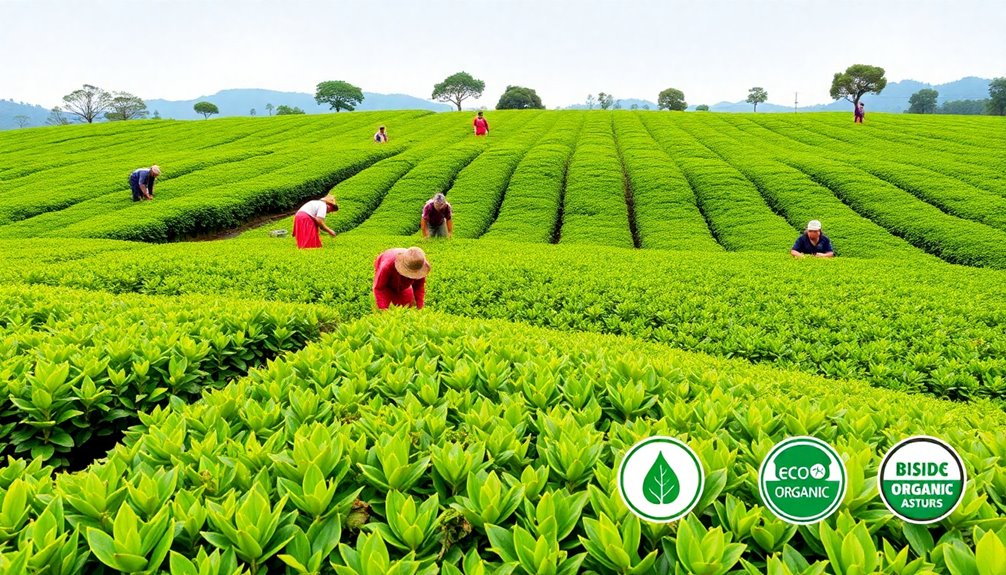
Consumers today are more informed than ever about where their products come from, and this awareness is reshaping the tea industry. You mightn't realize it, but a whopping 71% of people want to know how their tea is sourced. This demand for transparency is driving tea companies to adopt better farming practices and focus on sustainable tea.
Have you noticed more tea subscription services popping up? Many of them are dedicated to ethical sourcing, showing how consumer awareness is shifting towards supporting brands that care for our planet. Social media plays a big role, too! Educational campaigns highlight the benefits of sustainable tea, helping you make informed choices when you shop.
You might be happy to know that many consumers are even willing to pay a little extra for sustainably sourced products. That means more certified teas are showing up on store shelves, making it easier for you to choose ethically sourced options. Additionally, the growing interest in astrological compatibility suggests that consumers are increasingly seeking products that align with their values and beliefs.
This growing preference for ethical sourcing isn't just a trend; it's a movement towards a brighter, more responsible future for tea. So, next time you sip your favorite brew, remember that your choices can make a difference!
Cultural Heritage of Tea Sourcing
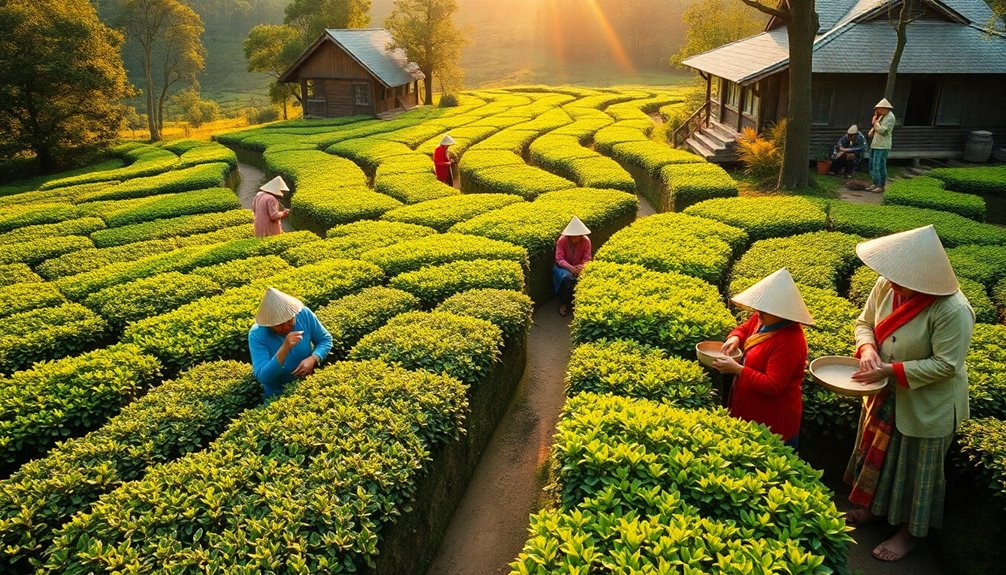
Tea sourcing is steeped in cultural heritage, with traditions that have been passed down through generations. When you sip your tea, you're enjoying a drink that tells a story. Each cup reflects the unique terroir and local customs of tea-growing regions, like China, India, and Japan. These places celebrate tea with special rituals and ceremonies, emphasizing quality and the artistry involved in preparing it.
Did you know there are over 2,500 different tea varieties worldwide? Each one showcases the rich cultural stories tied to its region. These stories are expressed through distinct flavors and brewing techniques, celebrating the heritage of the people who grow them.
Ethical sourcing of tea plays a crucial role in preserving these traditional practices. By supporting smallholder farmers, you help maintain their livelihoods and cultural traditions, especially as modern challenges arise. As more consumers become interested in ethically sourced teas, there's a growing appreciation for the cultural significance of tea. This connection not only enriches your tea-drinking experience but also honors the stories behind each cup, making every sip a celebration of culture and community.
Labor Rights Violations
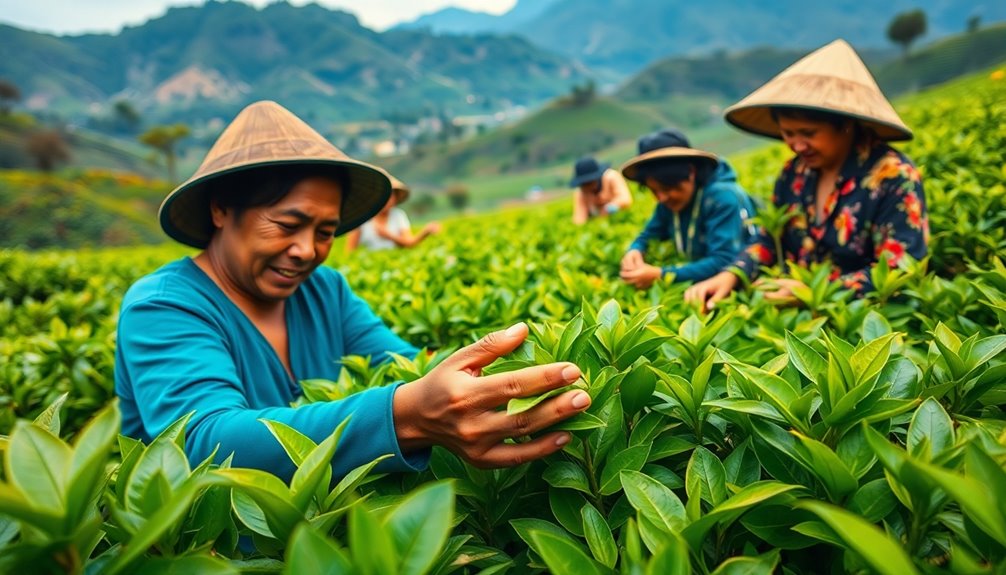
While you enjoy your cup of tea, it's important to recognize that not all tea is produced under fair conditions. Many tea workers face labor rights violations. They often earn exploitative wages, which means they don't make enough money to support their families. Imagine trying to live on less than the living wage!
In some regions, child labor is still a big problem. Reports show that around 60% of child workers in the tea sector perform hazardous tasks. That's really concerning!
Plus, workers on conventional tea plantations may deal with unsafe working conditions. They might be exposed to harmful pesticides without protective gear, putting their health at risk.
In countries like India and Sri Lanka, people have protested for better working conditions, showing how urgent this issue is.
Thankfully, ethical sourcing practices, like fair trade certification, work to change this. Fair trade ensures that producers follow rules to protect workers' rights and promote fair wages.
Practical Applications
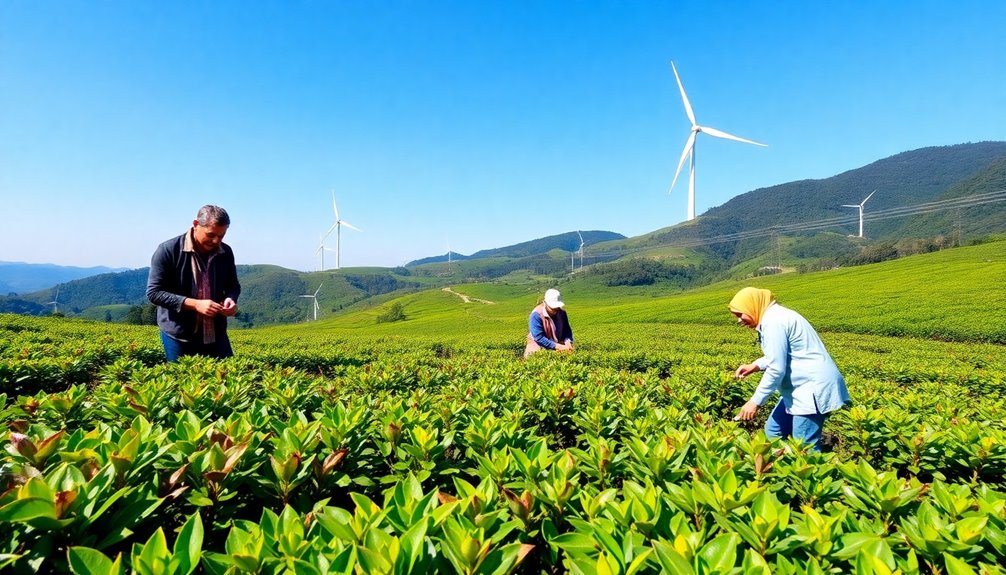
Sustainable tea sourcing offers practical solutions that can significantly improve both environmental and social outcomes. By choosing tea sourced using organic farming practices, you're helping reduce harmful pesticide use and protect our beautiful ecosystems. This way, future generations can enjoy the rich biodiversity that tea plants provide. Herbal teas are often made from various plants that can thrive in organic conditions, further promoting sustainability. Additionally, incorporating plants like Ilex paraguariensis into sustainable practices highlights the importance of biodiversity in the beverage industry. Aromatherapy can also play a role in enhancing the tea experience through its mood-lifting properties, making tea time even more enjoyable.
Direct trade relationships with smallholder farmers are another great way to make a difference. When you support these farmers, you ensure they earn fair wages, which empowers their communities. This not only improves their quality of life but also boosts local economies. Supporting local farmers can also help preserve traditional herbal tea practices that have been passed down through generations.
You can also look for tea brands that use biodegradable packaging. This helps cut down on waste and lowers the carbon footprint, making our planet a cleaner place.
Plus, using traceability tools lets you verify the origins of your tea. You can feel good knowing that ethical products are being sourced responsibly.
Investing in sustainable tea sourcing isn't just good for the planet; it's also smart for businesses. With more people wanting ethical products, brands that prioritize sustainability stand out and create a positive impact in the competitive beverage industry. Additionally, incorporating essential oils into your tea experience can enhance the overall flavor and health benefits, making it a more enjoyable choice.
Frequently Asked Questions
Why Is Sustainable Tea Important?
Sustainable tea's important because it protects the environment, supports ethical labor practices, and ensures high-quality products. By choosing sustainable options, you help farmers thrive, promote biodiversity, and contribute to a healthier planet for everyone.
How Did Purpose Help Lipton Embrace Sustainable Tea?
Purpose drove Lipton to embrace sustainable tea by prioritizing eco-friendly practices, enhancing transparency, and investing in community development. You'll find that these efforts not only improve tea quality but also resonate deeply with conscious consumers like you.
What Are the Environmental Issues With the Tea Industry?
The tea industry faces serious environmental issues, including deforestation, habitat loss, and pesticide use. You'll see soil depletion and water contamination affecting both ecosystems and tea quality, especially as climate change worsens these challenges.
Why Is Tea Important to the Economy?
Tea's crucial to the economy because it supports millions of farmers and workers, generates significant revenue, and boosts local communities. By investing in tea, you're contributing to livelihoods and enhancing economic stability in many regions.
Conclusion
In conclusion, sustainable tea sourcing is super important for everyone! As we enjoy our favorite tea, we can also help protect the planet and support farmers. By choosing tea that's grown responsibly, we're making a difference. We're celebrating the rich culture of tea and ensuring fair treatment for workers. So, the next time you sip that warm cup, remember that your choice matters! Let's keep spreading the joy of tea while caring for our world together!

